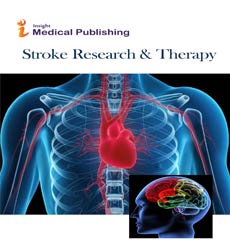Personalized Stroke Prevention and Management Strategies
Ajay Bhalla
Department of Neurology and Cerebrovascular Medicine, Saitama Medical University, Saitama, Japan
DOI10.36648/ipsrt.8.1.196
Ajay Bhalla*
Department of Neurology and Cerebrovascular Medicine, Saitama Medical University, Saitama, Japan
- *Corresponding Author:
- Ajay Bhalla
Department of Neurology and Cerebrovascular Medicine,
Saitama Medical University, Saitama,
Japan,
E-mail: ajay@gmail.com
Received date: February 27, 2024, Manuscript No. IPSRT-24-18889; Editor assigned date: February 29, 2024, PreQC No. IPSRT-24-18889 (PQ); Reviewed date: March 14, 2024, QC No. IPSRT-24-18889; Revised date: March 21, 2024, Manuscript No. IPSRT-24-18889 (R); Published date: March 28, 2024, DOI: 10.36648/ipsrt.8.1.196
Citation: Bhalla A (2024) Personalized Stroke Prevention and Management Strategies. Stroke Res Ther Vol.8.No.1:196.
Description
Stroke is a leading cause of mortality and morbidity worldwide, presents a complex interplay of genetic and environmental factors. Understanding the genetic underpinnings of stroke is pivotal in elucidating its pathogenesis, risk prediction and therapeutic interventions. In this review, we delve into the latest research elucidating the genetics of stroke, encompassing both monogenic and polygenic contributions, along with their clinical implications. Genetic predisposition significantly influences stroke susceptibility. Monogenic stroke syndromes, such as CADASIL and familial cerebral cavernous malformations, underscore the importance of rare genetic variants in stroke etiology. Furthermore, genome-wide association studies have identified numerous common genetic variants associated with stroke, highlighting the polygenic nature of this complex disorder. Variants within genes involved in various pathways, including inflammation, lipid metabolism, and coagulation, contribute to ischemic and hemorrhagic stroke risk. Multi-omics approaches facilitate the identification of novel biomarkers and therapeutic targets, paving the way for precision medicine in stroke management. Collaborative consortia and biobanks, such as the International Stroke Genetics Consortium (ISGC) and the UK Biobank, facilitate large-scale genomic studies by pooling resources and data from diverse populations. These initiatives accelerate discovery efforts, enhance statistical power, and promote data sharing to advance our understanding of stroke genetics globally. Artificial intelligence and machine learning algorithms offer powerful tools for analyzing complex genomic data sets, identifying disease-associated genetic variants, and predicting stroke risk. Integrating AI-based approaches into genetic research enhances predictive modeling and clinical decision support in stroke prevention and management.
Gene-environment interactions
Gene-environment interactions play a critical role in stroke pathogenesis. Modifiable risk factors such as hypertension, diabetes, and smoking interact with genetic variants to influence stroke susceptibility. For instance, the APOE gene polymorphism exacerbates the risk of ischemic stroke in individuals with concomitant hypercholesterolemia. Understanding these interactions could refine risk stratification strategies and guide personalized preventive interventions. Advances in genetic research hold promise for precision medicine approaches in stroke management. Genetic profiling may aid in risk prediction, allowing for early identification of individuals predisposed to stroke. Furthermore, insights into genetic mechanisms could inform the development of targeted therapies. For instance, antiplatelet agents targeting specific genetic pathways may offer enhanced efficacy and safety profiles. Additionally, genetic testing may facilitate familial screening and counseling, enabling early interventions to mitigate stroke risk in at-risk individuals. Despite significant strides, several challenges persist in translating genetic findings into clinical practice. The multifactorial nature of stroke necessitates comprehensive integration of genetic, clinical, and environmental factors for accurate risk assessment. Moreover, ethical considerations surrounding genetic testing, including privacy concerns and implications for insurability, warrant careful deliberation. Future research endeavors should focus on elucidating rare genetic variants, refining risk prediction models, and unraveling the intricate gene-environment interactions underlying stroke pathogenesis.
Stroke prevention
The burgeoning field of stroke genetics offers profound insights into disease mechanisms and therapeutic avenues. Integrating genetic information into clinical practice holds immense potential for personalized stroke prevention and management strategies. However, concerted efforts are warranted to address existing challenges and harness the full clinical utility of genetic discoveries in combating this formidable cerebrovascular disorder. Epigenetic modifications, such as DNA methylation and histone modifications, regulate gene expression without altering the underlying DNA sequence. Emerging evidence suggests that epigenetic changes contribute to stroke susceptibility and may serve as biomarkers for risk prediction and therapeutic targets. Transcriptomic studies, including RNA sequencing and microarray analyses, provide insights into gene expression patterns associated with stroke subtypes and outcomes. Differential gene expression profiles in stroke patients offer potential biomarkers for diagnosis, prognosis, and treatment response prediction. Pharmacogenomic research aims to identify genetic variants influencing drug response in stroke patients. Individual genetic variability in drug metabolism enzymes and drug targets may impact the efficacy and safety of pharmacological interventions, guiding personalized treatment selection and dosing. Advancements in genome editing technologies, such as CRISPR-Cas9, present opportunities for targeted manipulation of disease-associated genes implicated in stroke pathogenesis. Preclinical studies exploring gene editing and gene therapy approaches hold promise for novel therapeutic strategies in stroke treatment. Integrating data from multiple omics platforms, including genomics, transcriptomics, proteomics, and metabolomics, enables a comprehensive understanding of the molecular mechanisms underlying stroke.
Open Access Journals
- Aquaculture & Veterinary Science
- Chemistry & Chemical Sciences
- Clinical Sciences
- Engineering
- General Science
- Genetics & Molecular Biology
- Health Care & Nursing
- Immunology & Microbiology
- Materials Science
- Mathematics & Physics
- Medical Sciences
- Neurology & Psychiatry
- Oncology & Cancer Science
- Pharmaceutical Sciences
